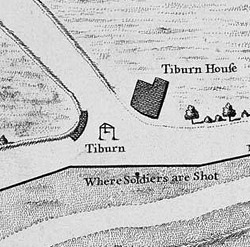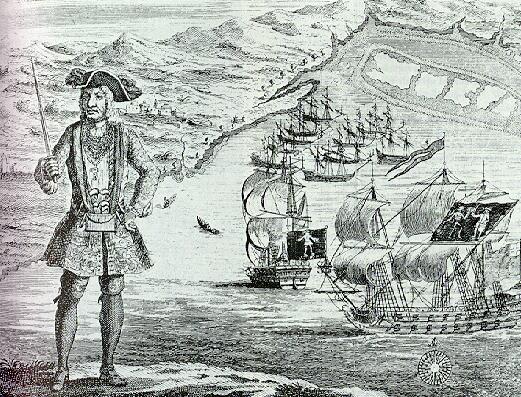|
Edward Low
Edward "Ned" Low (also spelled Lowe or Loe; 16901724) was a notorious pirate of English origin during the latter days of the Golden Age of Piracy, in the early 18th century. Low was born into poverty in Westminster, London, and was a thief from an early age. He moved to Boston, Massachusetts, as a young man. His wife died in childbirth in late 1719. Two years later, he became a pirate, operating off the coasts of New England and the Azores, and in the Caribbean. Low captained a number of ships, usually maintaining a small fleet of three or four. Low and his pirate crews captured at least a hundred ships during his short career, burning most of them. Although he was active for only three years, Low remains notorious as one of the most vicious pirates of the age with a reputation for violently torturing his victims before murdering them. Sir Arthur Conan Doyle described Low as "savage and desperate," and a man of "amazing and grotesque brutality." ''The New York Times'' call ... [...More Info...] [...Related Items...] OR: [Wikipedia] [Google] [Baidu] |
James Basire
James Basire (1730–1802 London), also known as James Basire Sr., was a British engraver. He is the most significant of a family of engravers, and noted for his apprenticing of the young William Blake. Early life His father was Isaac Basire (1704–1768), a cartographer, his son (1769–1822) and grandson (1796–1869) were also named James; these four generations of Basires were all engravers. Their longevity produced overlapping careers, which has led to difficulties in attribution of some works. Career A member of the Society of Antiquaries, James Basire specialized in prints depicting architecture. His studio was on Great Queen Street in London. His appointment as engraver to the society, as were all three generations, and much of his finest work is found in '' Vetusta Monumenta''. A major piece was his copperplate for ''Field of the Cloth of Gold'', an exquisitely detailed translation of a watercolour by Edward Edwards; this oversize historical print was issued on ... [...More Info...] [...Related Items...] OR: [Wikipedia] [Google] [Baidu] |
Arthur Conan Doyle
Sir Arthur Ignatius Conan Doyle (22 May 1859 – 7 July 1930) was a British writer and physician. He created the character Sherlock Holmes in 1887 for '' A Study in Scarlet'', the first of four novels and fifty-six short stories about Holmes and Dr. Watson. The Sherlock Holmes stories are milestones in the field of crime fiction. Doyle was a prolific writer; other than Holmes stories, his works include fantasy and science fiction stories about Professor Challenger and humorous stories about the Napoleonic soldier Brigadier Gerard, as well as plays, romances, poetry, non-fiction, and historical novels. One of Doyle's early short stories, "J. Habakuk Jephson's Statement" (1884), helped to popularise the mystery of the '' Mary Celeste''. Name Doyle is often referred to as "Sir Arthur Conan Doyle" or "Conan Doyle", implying that "Conan" is part of a compound surname rather than a middle name. His baptism entry in the register of St Mary's Cathedral, Edinburgh, gives " ... [...More Info...] [...Related Items...] OR: [Wikipedia] [Google] [Baidu] |
Burglary
Burglary, also called breaking and entering and sometimes housebreaking, is the act of entering a building or other areas without permission, with the intention of committing a criminal offence. Usually that offence is theft, robbery or murder, but most jurisdictions include others within the ambit of burglary. To commit burglary is to ''burgle'', a term back-formed from the word ''burglar'', or to ''burglarize''. Etymology Sir Edward Coke (1552–1634) explains at the start of Chapter 14 in the third part of '' Institutes of the Lawes of England'' (pub. 1644), that the word ''Burglar'' ("''or the person that committeth burglary''"), is derived from the words ''burgh'' and ''laron'', meaning ''house-thieves''. A note indicates he relies on the ''Brooke's case'' for this definition. According to one textbook, the etymology originates from Anglo-Saxon or Old English, one of the Germanic languages. (Perhaps paraphrasing Sir Edward Coke:) "The word ''burglar'' comes from the two ... [...More Info...] [...Related Items...] OR: [Wikipedia] [Google] [Baidu] |
Tyburn
Tyburn was a manor (estate) in the county of Middlesex, one of two which were served by the parish of Marylebone. The parish, probably therefore also the manor, was bounded by Roman roads to the west (modern Edgware Road) and south (modern Oxford Street), the junction of these was the site of the famous Tyburn Gallows (known colloquially as the "Tyburn Tree"), now occupied by Marble Arch. For this reason, for many centuries, the name Tyburn was synonymous with capital punishment, it having been the principal place for execution of London criminals and convicted traitors, including many religious martyrs. It was also known as 'God's Tribunal', in the 18th century. Tyburn took its name from the Tyburn Brook, a tributary of the River Westbourne. The name Tyburn, from Teo Bourne, means 'boundary stream',Gover, J. E. B., Allen Mawer and F. M. Stenton ''The Place-Names of Middlesex''. Nottingham: English Place-Name Society, The, 1942: 6. but Tyburn Brook should not be confused ... [...More Info...] [...Related Items...] OR: [Wikipedia] [Google] [Baidu] |
Hanging
Hanging is the suspension of a person by a noose or ligature strangulation, ligature around the neck.Oxford English Dictionary, 2nd ed. Hanging as method of execution is unknown, as method of suicide from 1325. The ''Oxford English Dictionary'' states that hanging in this sense is "specifically to put to death by suspension by the neck", though it formerly also referred to crucifixion and death by impalement in which the body would remain "hanging". Hanging has been a common method of capital punishment since Middle Ages, medieval times, and is the primary execution method in numerous countries and regions. The first known account of execution by hanging was in Homer's ''Odyssey'' (Book XXII). In this specialised meaning of the common word ''hang'', the past and past participle is ''hanged'' instead of ''hung''. Hanging is a common method of suicide in which a person applies a ligature to the neck and brings about unconsciousness and then death by suspension or partial suspensi ... [...More Info...] [...Related Items...] OR: [Wikipedia] [Google] [Baidu] |
House Of Commons Of The United Kingdom
The House of Commons is the lower house of the Parliament of the United Kingdom. Like the upper house, the House of Lords, it meets in the Palace of Westminster in London, England. The House of Commons is an elected body consisting of 650 members known as members of Parliament (MPs). MPs are elected to represent constituencies by the first-past-the-post system and hold their seats until Parliament is dissolved. The House of Commons of England started to evolve in the 13th and 14th centuries. In 1707 it became the House of Commons of Great Britain after the political union with Scotland, and from 1800 it also became the House of Commons for Ireland after the political union of Great Britain and Ireland. In 1922, the body became the House of Commons of the United Kingdom of Great Britain and Northern Ireland after the independence of the Irish Free State. Under the Parliament Acts 1911 and 1949, the Lords' power to reject legislation was reduced to a delaying power. The ... [...More Info...] [...Related Items...] OR: [Wikipedia] [Google] [Baidu] |
Footman
A footman is a male domestic worker employed mainly to wait at table or attend a coach or carriage. Etymology Originally in the 14th century a footman denoted a soldier or any pedestrian, later it indicated a foot servant. A running footman delivered messages.The Concise Oxford Dictionary, He might run beside or behind the carriages of aristocrats, running alongside the coach to make sure it was not overturned by such obstacles as ditches or tree roots. A footman might also run ahead to the destination to prepare for his lord's arrival. Roles The name was applied to a household servant who waited at table and attended, rode on, his employer's coach or carriage in case of untoward incidents. The ''first footman'' was the designation given to the highest-ranking servant of this class in a given household. The first footman would serve as deputy butler and act as butler in the latter's absence, although some larger houses also had an under-butler above the first footman. In a la ... [...More Info...] [...Related Items...] OR: [Wikipedia] [Google] [Baidu] |
Pickpocket
Pickpocketing is a form of larceny that involves the stealing of money or other valuables from the person or a victim's pocket without them noticing the theft at the time. It may involve considerable dexterity and a knack for misdirection. A thief who works in this manner is known as a pickpocket. As an occupation Pickpockets and other thieves, especially those working in teams, sometimes apply distraction, such as asking a question or bumping into the victim. These distractions sometimes require sleight of hand, speed, misdirection and other types of skills. Pickpockets may be found in any crowded place around the world. However, Barcelona and Rome were recently singled out as being particularly dangerous pickpocket havens. Thieves have been known to operate in high traffic areas such as mass transit stations, even boarding subway trains so they can use the distractions of crowds and sudden stop-and-go movements from the train to steal from others. As soon as the thieves have w ... [...More Info...] [...Related Items...] OR: [Wikipedia] [Google] [Baidu] |
Illiteracy
Literacy in its broadest sense describes "particular ways of thinking about and doing reading and writing" with the purpose of understanding or expressing thoughts or ideas in Writing, written form in some specific context of use. In other words, humans in literate societies have sets of Social practice, practices for producing and consuming writing, and they also have Social representation, beliefs about these practices. Reading, in this view, is always reading something for some purpose; writing is always writing something for someone for some particular ends. Beliefs about reading and writing and its value for society and for the individual always influence the ways literacy is taught, learned, and practiced over the lifespan. Some researchers suggest that the history of interest in the concept of "literacy" can be divided into two periods. Firstly is the period before 1950, when literacy was understood solely as alphabetical literacy (word and letter recognition). Secondly ... [...More Info...] [...Related Items...] OR: [Wikipedia] [Google] [Baidu] |
Google Books
Google Books (previously known as Google Book Search, Google Print, and by its code-name Project Ocean) is a service from Google Inc. that searches the full text of books and magazines that Google has scanned, converted to text using optical character recognition (OCR), and stored in its digital database.The basic Google book link is found at: https://books.google.com/ . The "advanced" interface allowing more specific searches is found at: https://books.google.com/advanced_book_search Books are provided either by publishers and authors through the Google Books Partner Program, or by Google's library partners through the Library Project. Additionally, Google has partnered with a number of magazine publishers to digitize their archives. The Publisher Program was first known as Google Print when it was introduced at the Frankfurt Book Fair in October 2004. The Google Books Library Project, which scans works in the collections of library partners and adds them to the digital inv ... [...More Info...] [...Related Items...] OR: [Wikipedia] [Google] [Baidu] |
A General History Of The Pyrates
''A General History of the Robberies and Murders of the most notorious Pyrates'' is a 1724 book published in Britain containing biographies of contemporary pirates,''A general history of the robberies & murders of the most notorious pirates''. By Charles Johnson. Introduction and commentary by Emmett Remis. Conway Maritime Press, 2002. which was influential in shaping popular conceptions of pirates. Its author uses the name Captain Charles Johnson, generally considered a for one of London's writer-publishers. The pr ... [...More Info...] [...Related Items...] OR: [Wikipedia] [Google] [Baidu] |
Captain Charles Johnson
Captain Charles Johnson was the British author of the 1724 book '' A General History of the Robberies and Murders of the most notorious Pyrates'', whose identity remains a mystery. No record exists of a captain by this name, and "Captain Charles Johnson" is generally considered a pen name for one of London's writer-publishers. Some scholars have suggested that the author was actually Daniel Defoe, but this is disputed. A prime source for the biographies of many well known pirates of the era, Johnson gave an almost mythical status to the more colourful characters, and it is likely that the author used considerable artistic licence in his accounts of pirate conversations. First appearing in Charles Rivington's shop in London, the book sold so well that by 1726, an enlarged fourth edition had appeared. English naval historian David Cordingly writes: "It has been said, and there seems no reason to question this, that Captain Johnson created the modern conception of pirates." Charac ... [...More Info...] [...Related Items...] OR: [Wikipedia] [Google] [Baidu] |






.jpg)



